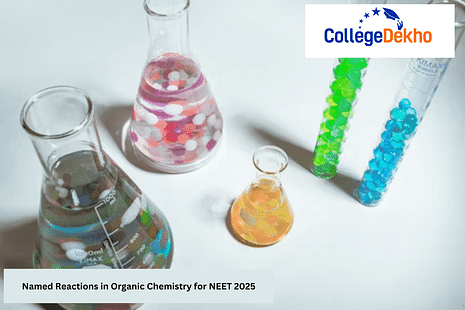Named Reactions in Organic Chemistry for NEET 2025 consist of reactions like Etard’s Reaction, Tischenko reaction, Wolf Kishner Reduction etc. Know more here!
- List of Important Named Reactions in Organic Chemistry for NEET …
- Correct Understanding Approach for Named Reactions Mechanism
- Tips to Master Named Reactions in Organic Chemistry for NEET …
- Significance of Named Reactions in Organic Chemistry for NEET 2025 …
- Preparation Strategy to Score Good Marks in Organic Chemistry
- Faqs

Named Reactions in Organic Chemistry for NEET 2025 consist of important reactions like Clemmensen Reduction, Claisen condensation, Etard’s Reaction etc. It is one of the most important chapters in the NEET 2025 Syllabus . The Named Reactions in Organic Chemistry chapter carries a weightage of 35.6 per cent. There are 15 to 20 questions asked in the NEET exam from Named Reactions in Organic Chemistry chapter. Students must understand the chemical reactions in this chapter rather than mugging the formulas during NEET Exam Preparations . They must mind map the important reactions of chemicals and make short notes of changes while they study. This learning process will help students to recall their learnings and learning the important topics in the chapters will not be a daunting task. In this article, know in detail about the important reactions to the Named Reactions in Organic Chemistry for NEET 2025, understanding approach, tips to score good marks and more.
List of Important Named Reactions in Organic Chemistry for NEET 2025
There are numerous reactions in class 11 and 12 that students will have to study for the NEET examination . Students can find the list of named reactions in Organic Chemistry for NEET 2025 given below.
- Clemmensen Reduction
- Claisen condensation
- Etard’s Reaction
- Friedel-Crafts alkylation
- Friedel Crafts Acylation
- Fries Rearrangement
- Gattermann-Koch Reaction
- Grignard Reagent
- Hell-Volhard-Zelinsky Reaction
- Hunsdieker reaction
- Hoffmann Bromamide Degradation
- Jones reagent
- Kolbes Reaction
- Knoevenagel Reaction
- Meerwein-Ponndorf-Verley Reduction
- Perkin Condensation
- Pinacol-Pinacolone Rearrangement
- Reformatsky Reaction
- Reimer-Tiemann Reaction
- Schmidt Reaction
- Schotten Baumann Reaction
- Stephen’s Reduction
- Tischenko reaction
- Williamson's synthesis
- Wittig Reaction
- Wolf Kishner Reduction
- Wurtz Reaction
- Aldol condensation
- Baeyer-villiger-oxidation
- Beckmann Reaction
- Arndt Reaction
- Benzoin Condensation
- Cannizaro Reaction
- Acyloin Condensation
- Birch Reduction
- Diels-Alder Reaction
- Dieckmann Reaction
- Curtius Reactions
- Dienone Phenol Rearrangements
Correct Understanding Approach for Named Reactions Mechanism
Students have to learn certain approaches to become pros in NEET UG organic chemistry topics. There are certain rules and laws that students must know to understand organic chemistry. In the
NEET Chemistry Question Paper
, organic chemistry has the maximum score weightage. In the NEET exam, there are 30 to 40 questions from organic chemistry in the chemistry section. Students are not required to mug formulas but rather understand the mechanisms of the reactions. They must very carefully study the rules and read the theory. Students must understand the basics of Organic Chemistry and then study reactions in organic chemistry so they will be able to understand better.
The most common mistake while studying organic chemistry chapters students make is that they try to memorise the formulas. They should avoid it rather than work on understanding the theory. They then must understand the process of reaction and the ways reaction is proceeding in the process rather than thinking “why” or “How” they occur. Students must read the theory to understand the concept of cause and effect in a particular reaction. Once students understand the cause of the reaction then they will also be able to comprehend the effect that is occurring in the reaction. The effect of the chemical reaction is directly proportional to the cause of the reaction. Students must practice
NEET 2024 Chemistry Revision Notes
to better understand the reactions and the causes behind them. These revision notes consist of the well-explained theory behind a reaction and the effect of the cause for the reaction.
Tips to Master Named Reactions in Organic Chemistry for NEET 2025
Studying named reaction chapters in organic chemistry is not an impossible task with a strategic approach and realistic study roadmap. Students can find the tips to master the Named Reactions chapter in Organic Chemistry for NEET 2025 given below.
- Students must build a very good understanding of chemical bonding and general organic chemistry.
- Students must learn the basics of E-1, E-2, SN-1 and SN-2 reactions that place and proceed. Students must study the theory behind it as it will help them to understand the concepts behind named reactions.
- In the beginning, students must start studying Adol condensation. Then, they must master the concepts & theory, then practice NCERT class 12 reactions.
- Students must understand the phenomena behind a chemical reaction to remember topics from the named reactions more effectively.
- Students must understand the use of elements and compounds to better comprehend the reaction during revisions.
Significance of Named Reactions in Organic Chemistry for NEET 2025
The named
reaction chapter is one of the most essential chapters in organic chemistry as it mostly teaches about the reactions of several elements and compounds. It tells about the formation of pie and sigma bonds with the help of different elements and compounds that further form new molecules. Named Reactions chapters teach students about breaking and making covalent bonds. It consists of several steps that students must understand to get a hold of the phenomena in the reaction process of chemicals. Named reaction also highlights basic reaction concepts that help in predicting future steps in any occurring reaction . Further, students can go through a strategic roadmap to study reactions more effectively.
- Students must study the kinetics of the reaction with the help the of rate-determining step method.
- Students must learn the Isolation of the intermediates. They must master topics like stable carbocation or carbon free radicals etc.
- Students must study reactions in the presence of various similar substrates with different catalysts that work during the reaction.
- Students must study isotopically labelled atoms in the reactants as it is very essential to know the mechanism of Name reactions.
- Students must learn the method of trapping free radicals with the help of a few reagents while studying named reactions.
- Students must also study crossover experiments and stereochemical aspects while studying named reactions.
Preparation Strategy to Score Good Marks in Organic Chemistry
There are numerous preparation techniques and strategies that students can apply to score good marks in the organic chemistry section. Students can find the tips and strategies mentioned below.
- Students must start reading and understanding the preparation of GOC chapters to understand the chemical reaction effects. It will also help them understand the reaction effects applications. For example, inducing effect resonance & hyperconjugation and their application in the organic reaction mechanism.
- Students after mastering GOC must study isotherm and then hydrocarbon.
- Students while studying named reactions, must be able to understand elimination and substitution reaction mechanisms and several other mechanisms.
- Students must have clarity regarding the concepts and must have a good memory regarding the formulas. This can be attained with proper practice of theory and understanding of the cause and effect of a chemical reaction.
- Students can practice the 3R method where they read, revise, and repeat reaction theories. For the chemical reaction observe cause & effect keenly in visual format to capture the incident along with the causes and effect. It will help them to learn the chemical reaction more effectively.
Therefore, these were the list of named reaction topics along with tips and strategies that they must study. Further, in case of doubts regarding the Named Reactions in Organic Chemistry for NEET 2025 log on to our CollegeDekho QnA Zone . Students can even contact the toll-free helpline number 18005729877.
Are you feeling lost and unsure about what career path to take after completing 12th standard?
Say goodbye to confusion and hello to a bright future!

FAQs
Named Reactions in Organic Chemistry for NEET cannot be studied by mugging the formulas. Students must understand the phenomenon, the cause of a chemical reaction, and the effect of the chemical reaction. It will help students to recall the formulas, the reactions and the theory behind it more effectively.
In Organic Chemistry, Named Reactions teaches students about the phenomenon of chemical reactions. The chapter teaches aboutthe pie and sigma bonding phenomenon, its causes, its effects and the theory behind its occurrence.
The topics in the Named Reactions in Organic Chemistry for NEET 2025 are Hoffmann Bromamide Degradation, Jones reagent, Kolbes Reaction etc. Students must study all the topics effectively to understand the reactions, concepts behind them and the final product after it.
NEET Previous Year Question Paper
Was this article helpful?



















Similar Articles
Top Government Medical Colleges in India 2025
Kerala NEET Merit List 2025: Dates, How to Download MBBS/BDS Rank List PDF, Topper’s List
NEET 2025 Login Application Number and Password - Steps to Retrieve
NEET PG 2025 M.S. General Surgery Cutoff (Expected): Know Opening & Closing Ranks
NEET 2025 Cutoff for CMC Vellore: Previous Year Cutoff Trends
MP NEET UG Merit List 2025 PDF (Soon): Dates, Download PDF, Rank List